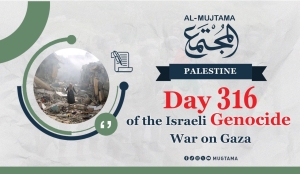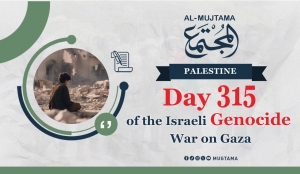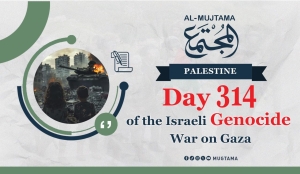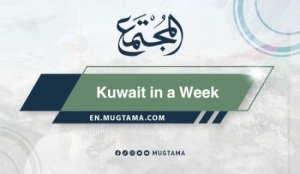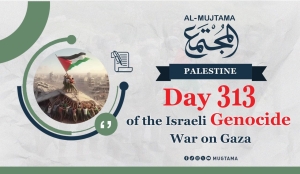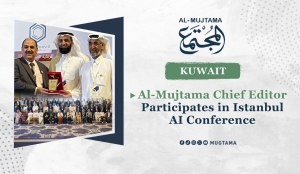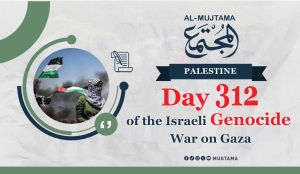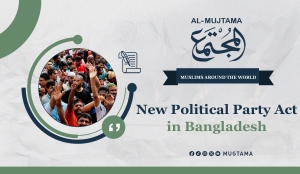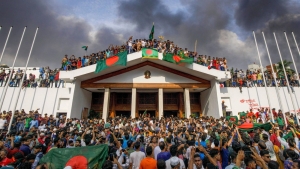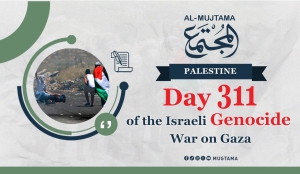Admin Mugtama
Day 316 of the Genocide War on Gaza
August 17, 2024The Zionist occupation forces continue to commit the crime of genocide in the Gaza Strip, for the 316th consecutive day, through dozens of air strikes and artillery shelling, committing massacres against civilians, amid a disastrous humanitarian situation due to the siege, with over 95% of the population displaced.
More massacres
Correspondents reported that the occupation aircraft and artillery continued their violent raids and shelling - on Saturday - in various parts of the Gaza Strip, targeting homes, displaced people's gatherings, and streets, resulting in dozens of martyrs and wounded.
The occupation forces continue their ground invasion of wide neighborhoods in Rafah, since May 7, and several axes of Gaza amid aerial and artillery bombardment and committing horrific massacres.
The occupation artillery shelled the northwestern areas of Khan Yunis city in southern Gaza.
Raids on Khan Yunis
The occupation aircraft launched a new raid on the city of Hamad west of Khan Yunis, Saturday evening, after a series of raids yesterday destroyed 6 towers and several residential apartments.
A martyr fell and others were injured as the occupation artillery shelled a residential apartment for the "Abu Amer" family inside Al-Nuri Tower in the Mafti area north of the Nusairat camp in central Gaza.
The occupation army shelled a residential tower in the Nusairat camp in central Gaza.
An unidentified martyr from the Shakoush area in Rafah was brought to Nasser Hospital as a result of an Israeli shelling.
Deir al-Balah
3 martyrs were retrieved from a house belonging to the "Abu Al-Naja" family in the Hikr area south of Deir al-Balah in central Gaza due to the occupation artillery shelling.
The occupation aircraft shelled a house belonging to the "Al-Louh" family near the Al-Shawa area in Deir al-Balah in central Gaza, with no reported injuries.
Media sources reported the arrival of 9 martyrs at Nasser Hospital since this morning due to the continuous targeting by the occupation.
The occupation aircraft launched several air raids on the residential towers in the city of Hamad north of Khan Yunis.
The occupation artillery intensively shelled the vicinity of the mills area north of Khan Yunis.
Destruction of a residential square
Local sources reported the destruction of a residential square by the occupation forces in the Qarara town northeast of Khan Yunis.
Medical sources reported the arrival of a martyr and several injuries to the Kuwait Specialized Hospital due to artillery shelling of a group of citizens in the vicinity of Hamad city north of Khan Yunis.
Two citizens were martyred as a result of an Israeli military march targeting a horse-drawn cart in the Zana area east of Khan Yunis.
Killing Children
The child Yusuf Abu Ayada (6 years old) was martyred after he was shot in the head by a "quadcopter" drone, while he was sleeping at night in a displacement tent in the vicinity of Hamad city in Khan Yunis.
Artillery shelling renewed in the western line, the area of the mills, and the outskirts of the city of Hamad northwest of Khan Yunis. Meanwhile, civil defense crews managed to recover the body of a martyr from the Abu Zareefa family's house, which was targeted by occupation aircraft a week ago in the town of Abasan al-Kabira in Khan Yunis.
A child was also injured as a result of gunfire targeting the tents of displaced persons near the residential city of Hamad northwest of Khan Yunis in the southern Gaza Strip.
In the central Gaza Strip, 16 martyrs and a number of citizens were killed and injured early this Saturday morning as a result of occupation targeting barracks in the Zawaida area in the central Gaza Strip, while Israeli artillery shelled areas north of the Nusairat camp in the central Gaza Strip.
In the city of Gaza, ambulance and emergency crews managed to recover the body of a martyr and three injuries following the targeting of the house of the Maadi family in the Sheikh Radwan neighborhood.
Three Palestinians were martyred and others were injured in an Israeli bombardment targeting a house near the Al-Farouq Mosque in the Zaytoun neighborhood south of the city.
Israeli artillery renewed its shelling of the Sabra neighborhood in Gaza City, according to local sources. Israeli warplanes also targeted a residential apartment in the Sabra neighborhood south of Gaza City, without any reported casualties or injuries.
Two Palestinians from the "Azzam" family were martyred in a drone strike near the intersection of Dawa in the Zaytoun neighborhood in Gaza City.
Occupation aircraft also targeted the Tel al-Sultan neighborhood west of Rafah City in the southern Gaza Strip, destroying several residential buildings.
On Friday evening, the Israeli army issued new orders for forced displacement in the northern neighborhoods of Khan Yunis and east of Deir al-Balah, claiming that this displacement is "temporary."
Dangerous Warning
Under the title "Dangerous Warning," the occupation army published a statement and dropped flyers from the air, calling on residents and displaced persons in the central and southern areas of the Gaza Strip to evacuate immediately, including the eastern neighborhoods of Deir al-Balah, the northwestern areas of Khan Yunis (including Al-Qarara, Al-Mawasi, Al-Jalaa, Hamad, and Al-Nasr).
With this new warning, the Israeli occupation further reduces the safe humanitarian zone that it previously claimed was "safe," and includes hundreds of thousands of Palestinians who have been displaced from all over the devastated Gaza Strip.
Yesterday, the Palestinian Ministry of Health announced the first case of polio in the southern provinces, in the city of Deir al-Balah for a 10-month-old child who did not receive any polio immunizations.
Day 315 of the Genocide War on Gaza
August 16, 2024The Israeli occupation forces continue to commit genocide in the Gaza Strip, for the 315th consecutive day, through dozens of airstrikes and artillery shelling, committing massacres against civilians, amid a catastrophic humanitarian situation as a result of the siege and the displacement of more than 95% of the population.
Brutal airstrikes and shelling
Correspondents reported that the occupation aircraft and artillery continued their violent airstrikes and shelling - on Friday - in various parts of the Gaza Strip, targeting homes, displaced persons' gathering places, and streets, resulting in dozens of martyrs and wounded.
The occupation forces continued their ground invasion of wide neighborhoods in Rafah since May 7, and several axes in Gaza amidst aerial and artillery shelling and committing horrific massacres.
Martyrs in Zaitoun and Khan Younis
Two civilians were killed by the occupation's shelling of Samama Street in the Zaitoun neighborhood southeast of Gaza City.
Four civilians were injured by Zionist artillery shelling near the Asdaa city west of Khan Younis.
Hamad City
Correspondents reported that the occupation forces warned the evacuation of several towers in the Hamad City in Khan Younis in preparation for bombing them, while the occupation forces advanced east of Deir al-Balah reaching Salah al-Din Street before shelling it simultaneously.
Intensive firing in Khan Younis.
Local sources reported that occupation helicopters were intensively firing towards the outskirts of Khan Younis.
Two displaced persons were martyred in a raid targeting the occupation tent on Badaw Street in the western sector; they are Khalid Ibrahim Ahmed al-Franni and his son Ahmed.
Four martyrs, including a woman and three children from the Al-Aqad family, were killed, and three civilians were injured in the occupation's targeting of the displaced persons' tent near the Doctors Without Borders headquarters in Al-Mawassi west of Khan Younis.
The martyrs are: Noor Abdel Karim Al-Abadla / Al-Aqad and her children Lana, Reema, and Alma.
Raids on the Hukr al-Jamie
The occupation aircraft launched several raids on the Hukr al-Jamie neighborhood in Deir al-Balah in the central Gaza Strip.
The occupation aircraft bombed the Wadi al-Salqa area east of Deir al-Balah in the central Gaza Strip.
The occupation forces issued new evacuation orders this morning in Khan Younis, including reducing the area of Al-Mawassi, as well as Deir al-Balah, and the orders included areas that the occupation has long claimed as humanitarian areas, and this area includes more than 200,000 citizens.
A citizen was martyred and others were injured by an Israeli drone strike targeting a group of citizens near the printing tower in the Saraya area in the center of Gaza City.
Day 314 of the Genocide War on Gaza
August 15, 2024Israeli occupation forces continue their aggression on Gaza Strip for the 314th consecutive day, through dozens of airstrikes and artillery shelling, while committing horrific and gruesome massacres against civilians.
On the ground.. Dozens of martyrs and wounded
Dozens of martyrs and wounded continued to fall as the Israeli warplanes and artillery intensified their raids and heavy shelling on various areas of the Gaza Strip, targeting homes, displaced people's gatherings, and streets, resulting in numerous casualties. Three martyrs, including two women, were killed in an attack by an Israeli drone east of Khan Younis, and the Civil Defense teams retrieved the body of a man from the Mabah area. The Israeli forces also targeted the Saudi neighborhood and the Sultan neighborhood west of Rafah city in the southern Gaza Strip, resulting in the martyrdom of 3 citizens and the injury of others in an Israeli shelling that targeted a house in the Sabra neighborhood south of Gaza City.
Renewed shelling
The occupation boats targeted the beaches of Gaza City. Coinciding with the firing of an Israeli Quadcopter drone on the Hassan al-Banna area in the Zeitoun neighborhood, the occupation forces also penetrated the vicinity of the Al-Barasi land, the curtain factory, and Al-Sikka Street.
The occupation forces renewed their targeting and shelling of the Bani Suhaila town, east of Khan Yunis, coinciding with the firing east of the Al-Qarara town, northeast of Khan Yunis.
The occupation forces' artillery also shelled the vicinity of the Islamic complex in the Al-Sabra neighborhood and south of the Zeitoun neighborhood, coinciding with the launching of a raid by warplanes on Gaza City.
The Israeli warplanes also targeted a house in the Ma'an area, southeast of Khan Yunis, and the Bani Suhaila town, east of the city, and the occupation forces blew up a number of residential buildings west of Rafah city, and residential blocks in the Al-Qarara town, northeast of Khan Yunis.
The Resistance Confronts
The Palestinian resistance continues its operations in various combat axes, confronting the incursions of the occupation forces in the Gaza Strip, especially in the city of Khan Yunis, south of the Strip and the vicinity of the Rafah land crossing, in addition to targeting the "Netzarim" axis.
The Al-Qassam Brigades, the military wing of Hamas, published footage of their targeting an Israeli force entrenched inside the Indonesian hospital in the Tel al-Sultan neighborhood west of Rafah city in the southern Gaza Strip using the "TBG" anti-fortification and anti-personnel shells.
Meanwhile, the Al-Quds Brigades, the military wing of the Islamic Jihad Movement, targeted an enemy soldier position on the supply line in the "Netzarim" axis using mortar shells. They also launched rockets at a leadership headquarters affiliated with the occupation in the north of Khan Younis city.
Kuwait in a Week
August 15, 2024
Al-Mujtama Chief Editor Participates in Istanbul AI Conference
AI Conference and its Role in Investment and Development kicked off in Istanbul, with a remarkable presence of official figures and representatives of civil society organizations and the private sector, in addition to the participation of delegations from more than 30 countries.
The conference focused on the importance of AI in various fields, such as training, education, and strategic analysis, which was confirmed by the conference chairman, Dr. Hamad Al-Marri, in the opening session.
Dr. Younis Khataybeh, Chairman of the Arab Trainers Union, highlighted the importance of the conference in keeping pace with rapid technological developments and their impact on business environments, extending his thanks to those in charge of organizing the conference.
Dr. Nader Ghazal, an expert in AI, reviewed the differences between artificial and human intelligence and the future of this technology.
At the end of the opening session, Major General Fahd bin Mubarak Al-Jabareen, Chairman of the Jowan bin Jassim Academy, was honored as the conference's guest of honor. The first and second sessions of the conference witnessed discussions on future professions and sciences and the role of artificial intelligence in institutional development, amid great interaction from the attendees.
Al-Mujtama Participation
One of the most prominent segments of the conference was a worksheet presented by Dr. Salem Hamad Al-Qahtani, Editor-in-Chief of the Kuwaiti magazine "Al-Mujtama", which discussed the role of artificial intelligence in improving and analyzing data and media content.
Al-Qahtani reviewed the experience of "Al-Mujtama" magazine in using artificial intelligence to improve interaction with content and media archives, pointing out the practical benefits of this technology in producing automated content, editing video and audio, and smart archiving.
Dr. Al-Qahtani explained how artificial intelligence could revolutionize how media archives are managed, from the textual classification of content to developing video and image archiving in the coming stages. This development will contribute to improving search and retrieving information quickly and accurately.
Dr. Al-Qahtani concluded his presentation by emphasizing the benefits of using artificial intelligence in the media, such as developing advanced search tools, providing automatic statistics, and improving the user experience through immediate interaction with the audience. He also pointed out the importance of prediction and scheduling in identifying the topics that most attract the audience and scheduling their publication according to the optimal times to achieve the greatest possible interaction.
KRCS first aid plane departs for Sudan
KUWAIT: The Kuwait Red Crescent Society (KRCS) announced on Wednesday the departure of the first aid plane as part of Kuwait’s humanitarian air bridge. The aircraft, equipped by the KRCS, is loaded with 10 tons of aid materials, including protective equipment and tents to support and provide relief to the Sudanese people who were displaced by the ongoing conflicts, heavy rain, and floods. KRCS Deputy Chairman, Anwar Al-Hasawi told KUNA that this flight marks the continuation of Kuwait’s relief efforts aimed at alleviating the suffering of the Sudanese people.
He added that the preparations and dispatch of this aid were part of the “Kuwait by Your Side” campaign, in line with the directives of the Amir His Highness Sheikh Mishal Al-Ahmad Al-Jaber Al-Sabah, which underscores Kuwait’s commitment to humanitarian work. Al-Hasawi emphasized that Sudan is currently experiencing heavy rains that have flooded entire villages and caused the collapse of dozens of houses, stressing the importance of supporting the Sudanese people during these challenging times. — KUNA
Kuwait... Major Changes in the Tax System
Kuwait, which has long been considered economically lagging behind other wealthy Gulf countries, is implementing radical reforms in its tax system to meet global standards and reduce its reliance on oil revenues. These reforms include several key measures:
1- 15% Corporate Profit Tax:
Kuwait plans to implement a new tax on corporate profits at a rate of 15%, which will apply to all companies, in a significant political shift towards a fairer tax system where companies contribute more to national revenues.
2- Double Taxation Avoidance Treaty with the UAE:
In preparation for these changes, Kuwait signed its first Double Taxation Avoidance Treaty with the UAE, aimed at enhancing tax transparency and reducing repeated taxes between the two countries, thus improving the investment climate.
3- New Taxes to Combat Tax Evasion:
The new reforms also include laws regulating the exchange of information between Kuwaiti tax authorities and their international counterparts, aiming to combat tax evasion and enhance tax justice, with fines of up to 20,000 Kuwaiti dinars (about 60,000 dollars) imposed on financial institutions that do not comply with these laws.
4- Cooperation with the Organization for Economic Cooperation and Development (OECD):
Kuwait has joined international efforts to combat tax evasion under the "Base Erosion and Profit Shifting" initiative, which includes over 140 countries, and has committed to implementing the global standard for automatic exchange of information, thereby enhancing its position in the international tax compliance ranking.
5- Excise Tax:
Kuwait is expected to impose an excise tax on some goods considered harmful to health or the environment, such as tobacco and soft drinks, as part of a strategy to adopt a simpler and more health- and environmentally-oriented tax system.
6- Postponement of Value Added Tax (VAT) Implementation:
Although Kuwait is one of two Gulf countries that have not yet implemented a value-added tax, experts believe that this tax will not be implemented in the near future due to the need for significant investments in technological infrastructure and human resources.
Impact of these Changes on the Kuwaiti Economy
These reforms are part of a broader strategy aimed at achieving economic diversification away from oil, improving tax system efficiency, and increasing non-oil revenues. Through these steps, Kuwait seeks to improve the business environment and attract more foreign investments, while maintaining its financial balance and achieving sustainable development.
Kuwaiti students urge international universities to pressure to halt Zionist occupation crimes
Kuwaiti student forces issued a press statement commemorating the 300th day of the "Flood of Al-Aqsa" battle, calling for the continuation of student activism worldwide against the crimes of the Zionist occupation. The statement reads as follows:
Since its establishment in the 1960s and across generations, the student movement, with its different orientations and diverse views, has been a faithful and proactive movement for all national and Arab and Islamic issues. Year after year of its sixty-year history since its official launch on December 24, 1964 in a statement issued in Cairo to establish the National Union of Kuwaiti Students, the movement finds young people carrying the banner in various issues, supporting the oppressed, defending rights, identity, and standing up against oppressors, with history and academic platforms testifying to it.
Therefore, student movements, as they revive the people of Palestine and its heroic and resilient population, especially in the face of their legendary resistance in the battle for liberation and struggle, the "Al-Aqsa Flood" battle over 300 days against the Zionist machine of extermination and killing with the support of colonial powers, find themselves only in the field of participation and support, doing everything they can to stand with the truth and confront falsehood. The blood of our pure martyrs, the determination of our brave resistance fighters, the sacrifice of our free prisoners, and the embrace of the Palestinian people for all of this, inspire us - after the help and support of Allah - to continue the march and support the liberation project through our student arenas so that we and they are on a date soon where the sun of freedom and liberation will rise.
Therefore, we call for and demand the following:
First: the continuation of student activism in all universities around the world to stop this brutal extermination, free the prisoners, open crossings, rebuild, hold this criminal entity accountable for its crimes and terrorism. This activism has proven its effective impact on the awareness of youth and exposing the colonial and rapacious project on our occupied land in Palestine.
Second: The student movement's interaction with the daily events and tragedies that we see in Palestine in general and Gaza in particular, pouring down on this besieged and forsaken people. Especially, the brutal "Dawn Massacre" that occurred yesterday in the Al-Tabeen School in the Al-Daraj neighborhood in the center of Gaza, where more than 100 martyrs and hundreds of wounded from the prayer prostrating reciters, whose pure blood mixed with Quran verses and prayer rugs far away. This interaction should lead to more initiatives, activities, and expressions of solidarity and support for the Palestinian right to resistance and freedom.
Third: The boycott of Arab, Islamic, and international universities of all forms of cooperation or recognition of the criminal Zionist entity, and that "academic normalization" projects do not pass between the beacons of knowledge and the corridors of our universities, faculties, and institutes.
Fourth: Considering and adopting the commemoration of October 7, 2023 as a global day for the peoples' activism, especially students and faculty members in universities and colleges, to renew the covenant and loyalty to the martyrs' blood and the struggle of the Palestinian people, and to keep the liberation of Palestine and the support for its legitimate resistance at the top of the priorities of public issues.
Long live the Kuwaiti student movement, and may Allah have mercy on our righteous martyrs, and glory to the brave resistance and victory to Palestine and Gaza, as we stand with them on the path of liberation, with the permission of Allah.
Former Kuwaiti PMs condemn Gaza massacres, urge international and Arab action
A number of former deputies in Kuwait expressed their strong condemnation for the massacres committed by the Zionist entity against innocent civilians in Gaza, affirming that these crimes represent a betrayal by the international and Arab community and a suspicious silence from those who claim to defend human rights. They called for taking a firm stance to protect the oppressed and hold the perpetrators of these atrocities accountable, emphasizing the importance of supporting the people of Gaza in the face of the heinous aggression.
Former Deputy Osama Al-Shahin said: "Silence on the daily massacres and contentment with cold condemnation without taking any action is a warning of punishment that includes both conspirators and bystanders alike. We are all called upon, each according to their abilities, to make efforts to protect the victims and the targeted. The more responsibility one has, the more they are held accountable for their actions."
In a related context, former deputy Mohamed Aldalal said: "The Zionists are a gang of cold-blooded murderers, who killed innocent civilians, including children, women, and men from the people of Gaza, with missiles and weapons provided to them by some Western countries. We are facing war criminals and bloodshed supported by accomplices. O Allah, the Zionists and those who support them are tyrants and corrupt, so take them with a strong and powerful grip."
Former deputy Adel Aldamkhi said: "The massacre of dawn is a painful testimony to the Islamic and Arab abandonment, and it bears witness to the genocide taking place in Gaza in silence by those who claim to defend human rights and freedoms. This massacre is a disgrace on the forehead of the hypocritical world, drowning in injustice and killing without restraint or accountability. O Allah, grant the people of Gaza patience, strengthen their feet, and support them against the disbelievers, pointing out that the international and Arab silence towards what is happening in Gaza is a betrayal of human values and justice, and we all must stand with our people in Gaza, supporting their cause and defending their right to live with dignity and security."
Former deputy Mohammed Haif Almutairi said: "I ask Allah for the martyrs to receive martyrdom and for all the people of Gaza to have patience and be comforted. The horrific scenes and continuous massacres against the people of Gaza will, by the permission of Allah, increase their strength and resilience, and raise their status as they continue their ongoing struggle against the Jews. This adds to the responsibility on the leaders of the nation, represented by the Organization of Islamic Cooperation. Can 57 Muslim countries not support the oppressed on the ground, including Muslims, especially in the case of Palestine, particularly Gaza, which the Zionists are trying to erase from the map with their successive massacres? But O people of Gaza, if Allah helps you, then there is no victor for you, and they plan and Allah plans, and Allah is the best of planners. I ask Allah for you near relief and great victory."
Former deputy Fahad Almasoud said: "Doesn't the international community feel ashamed and move to stop the massacres of the Zionist occupation?! The latest of these atrocities was the horrendous massacre committed by the occupation forces against the Taba'in school in the Daraja neighborhood in Gaza, which claimed the lives of innocent civilians, including women, children, the elderly, and men, amidst an eerie international silence towards these crimes. O Allah, support our brothers in Palestine and Gaza against their enemies and grant them patience and steadfastness. Allah is sufficient for us, and He is the best disposer of affairs."
Former deputy Khalid Alomaira said: "The schools housing displaced persons in Gaza were bombed, resulting in the deaths of more than 100 people and dozens wounded. These increasing brutal attacks by the Zionist entity deepen the suffering of innocent civilians, amidst a global silence that raises suspicion and a lack of accountability. Allah is the only helper, and we rely on Allah, the best protector. O Allah, protect them with Your protection."
Former deputy Mohammed Alhuwailah said: "With deep sorrow and sadness, we stand before the heinous massacre committed by the Zionists against the innocent people while they were performing the Fajr prayer. This atrocious crime represents a blatant violation of all human values and international laws. We pray to Allah to accept the martyrs, heal the wounded, and grant their families patience and solace."
He continued: "The massacre of dawn is a testimony to the abandonment of the international community and its suspicious silence in the face of this genocide, in a hypocritical world drowning in injustice and corruption. What is happening in Gaza is not just an attack but a blatant challenge to all principles of justice and human rights."
He added: "O Allah, grant the people of Gaza patience, strengthen their resolve, and grant them victory over the disbelievers. What is happening to our people in Gaza requires all of us to stand united in confronting this injustice, calling for justice to be served, and holding accountable the perpetrators of these heinous crimes."
International Islamic Charitable Organization provides school uniforms for 420 orphans in Uganda
The International Islamic Charitable Organization distributed school uniforms to orphaned and impoverished students who are under its care at the Al-Hayb Social Welfare Center in the Republic of Uganda.
In a press statement, the Deputy Director-General for Institutional Communication at the International Islamic Charitable Organization, Ibrahim Khalid Al-Badr, said: "With the grace of the Almighty, school uniforms were distributed to orphans at the Al-Hayb Social Welfare Center affiliated with the charity in Uganda, benefiting 340 orphans and 80 other students from poor families, as well as children of teachers and workers in the community surrounding the center."
He added: "The distribution included complete school uniforms, full sports uniforms, winter jackets, and shoes, as these items contribute to providing a suitable educational environment, at a total cost of $21,000."
He pointed out that the charitable organization always seeks to empower orphans educationally and morally in an exceptional educational environment, enabling them to make a positive impact in their community, within the comprehensive care provided to orphans, including educational, social, cultural, and health care, confirming that this is part of our continued commitment to supporting education and providing essential needs for children, within the framework of our strategic goals to provide educational and rehabilitative opportunities to achieve qualitative outcomes.
Al-Badr highlighted the charitable organization's keenness to implement the project at the Al-Hayb Social Welfare Center, which is one of the key centers affiliated with the organization in Uganda, playing a vital role in providing comprehensive care for orphaned and impoverished children, including education, healthcare, and psychological support.
He reminded that the International Islamic Charitable Organization continues its serious work to meet the needs of the vulnerable and needy groups, including orphans, through various projects aimed at improving their quality of life and providing exceptional educational opportunities, believing that supporting education is one of the key factors for achieving sustainable development and building a better future.
Al-Badr expressed deep gratitude to the generous donors, institutions, and individuals, affirming that their efforts greatly contribute to changing the lives of many beneficiaries, especially orphans, enabling them to continue their education in better conditions.
Day 313 of the Genocide War on Gaza
August 14, 2024The Israeli war of extermination against the people of the Gaza Strip entered its 313th day. The occupation began a new bloody day with new massacres, especially in the Maghazi and Nuseirat camps, while the Ministry of Health announced that the death toll from the Israeli aggression on the Strip had risen to 39,965 martyrs and 92,294 wounded since October 7.
Daily statistical report
The daily statistical report issued by the Palestinian Ministry of Health in the Gaza Strip today, Wednesday, August 14, stated that the occupation had committed two new massacres during the past 24 hours, which led to the arrival of 36 martyrs and 54 wounded to hospitals.
The ministry indicated that ambulance and civil defense crews were unable to reach a number of victims who were still trapped under the rubble and in the streets.
Targeting people’s houses
Late Tuesday night/Wednesday morning, an Israeli bombardment targeting a house in the Maghazi camp in the middle of the Strip resulted in the martyrdom of 4 Palestinians, including children, while others were wounded.
In Nuseirat camp, it was announced that 8 people were killed, most of them women and children, and others were injured after a house belonging to the Abu al-Nida family was targeted in the al-Hawouz area inside the camp.
Targeting Civilians
Medical sources reported that the martyrs and wounded were transferred to the al-Aqsa Martyrs Hospital in Deir al-Balah, while some residents buried their martyrs inside the hospital, and the process of retrieving the martyrs continued for hours.
In the Bani Suhaila area east of Khan Yunis, in the southern Gaza Strip, 4 Palestinians were killed by sniper fire from the occupation army, which targets civilians at its axes of concentration in the southern areas of the Strip.
In the same area, the Civil Defense in Gaza announced that its crews were able to retrieve the bodies of four martyrs from a residential apartment targeted by the occupation raids in one of the Hamad Towers, and ambulance crews reported that they retrieved the bodies of 3 other martyrs from the Tal al-Sultan neighborhood west of Rafah city.
Al-Mujtama Chief Editor Participates in Istanbul AI Conference
August 14, 2024AI Conference and its Role in Investment and Development kicked off in Istanbul, with a remarkable presence of official figures and representatives of civil society organizations and the private sector, in addition to the participation of delegations from more than 30 countries.
The conference focused on the importance of AI in various fields, such as training, education, and strategic analysis, which was confirmed by the conference chairman, Dr. Hamad Al-Marri, in the opening session.
Dr. Younis Khataybeh, Chairman of the Arab Trainers Union, highlighted the importance of the conference in keeping pace with rapid technological developments and their impact on business environments, extending his thanks to those in charge of organizing the conference.
Dr. Nader Ghazal, an expert in AI, reviewed the differences between artificial and human intelligence and the future of this technology.
At the end of the opening session, Major General Fahd bin Mubarak Al-Jabareen, Chairman of the Jowan bin Jassim Academy, was honored as the conference's guest of honor. The first and second sessions of the conference witnessed discussions on future professions and sciences and the role of artificial intelligence in institutional development, amid great interaction from the attendees.
Al-Mujtama Participation
One of the most prominent segments of the conference was a worksheet presented by Dr. Salem Hamad Al-Qahtani, Editor-in-Chief of the Kuwaiti magazine "Al-Mujtama", which discussed the role of artificial intelligence in improving and analyzing data and media content.
Al-Qahtani reviewed the experience of "Al-Mujtama" magazine in using artificial intelligence to improve interaction with content and media archives, pointing out the practical benefits of this technology in producing automated content, editing video and audio, and smart archiving.
Dr. Al-Qahtani explained how artificial intelligence could revolutionize how media archives are managed, from the textual classification of content to developing video and image archiving in the coming stages. This development will contribute to improving search and retrieving information quickly and accurately.
Dr. Al-Qahtani concluded his presentation by emphasizing the benefits of using artificial intelligence in the media, such as developing advanced search tools, providing automatic statistics, and improving the user experience through immediate interaction with the audience. He also pointed out the importance of prediction and scheduling in identifying the topics that most attract the audience and scheduling their publication according to the optimal times to achieve the greatest possible interaction.
Day 312 of the Israeli Genocide War on Gaza
August 13, 2024With the Israeli genocide war on Gaza entering its 312th day, the Israeli occupation army intensified its airstrikes and artillery shelling on various parts of the Gaza Strip. They increased the demolition of residential buildings and targeting of populated areas and shelters in Khan Yunis. The artillery renewed its shelling of populated areas and shelter centers to force their inhabitants to evacuate again, targeting what remains of buildings, homes, and schools that were not previously targeted.
This comes amidst ongoing battles between Palestinian resistance and the Israeli occupation army in Khan Yunis and clashes in other areas of the Strip.
The Ministry of Health in Gaza stated that the Israeli occupation army committed two massacres against families in the Gaza Strip in the past 24 hours. The victims reached 32 martyrs and 88 injured in hospitals, while some victims remain under the rubble or in the streets where ambulance crews cannot reach them.
More than 10000 Missing Persons
The Ministry of Health in its daily update today, Tuesday, August 13, 2024, announced an increase in the number of victims of the genocide war to 39,929 martyrs and 92,240 injured. This number does not include the unidentified martyrs and missing persons. The number of missing persons has reached more than ten thousand, according to the Palestinian Government Media Office.
More massacres
As the Israeli airstrikes continue, the Israeli occupation army committed a massacre against a family in Al-Bureij camp in the middle of the Gaza Strip, resulting in the martyrdom of 7 Palestinians after their house was bombed.
In Deir Al-Balah in the middle of the Strip, 4 Palestinians, including two children, were martyred as a result of Israeli shelling on the Qastal Towers east of the city.
Martyrs and wounded were also reported to have been transferred to the Al-Aqsa Martyrs Hospital as a result of Israeli shelling targeting a café next to the Global Kitchen headquarters in Al-Azzayza in Deir Al-Balah.
The Civil Defense confirmed the retrieval of 7 martyrs from the Abu Shareef family as a result of Israeli shelling targeting a group of Palestinians in Wadi Al-Salkha east of Deir Al-Balah.
The Civil Defense warned that its teams are facing extreme difficulty in extracting martyrs and injured individuals, explaining that they are moving on foot with simple manual equipment and animal-drawn carts to carry out their duties, stating in a statement: "This is a disgrace to humanity."
In the Maghazi camp, two Palestinians were killed and several others were injured as a result of an Israeli shelling on an apartment in a house belonging to the "Druish" family in the east of the camp.
Destroying residential homes
In the Maghraqa area north of the Nusairat camp, Israeli airstrikes this afternoon resulted in the destruction of entire residential blocks, the killing of martyrs, and the injury of other Palestinians.
The situation is the same in Khan Yunis in the south of the Gaza Strip, where the Israeli occupation continues to destroy residential homes in its aerial raids on the town of al-Qarara northeast of the city.
The number of martyrs has risen to 10, including children, following an Israeli shelling that targeted a house in the town of Abasan east of the city.
At the same time, fierce battles continue between Palestinian resistance factions and Israeli occupation soldiers in neighborhoods where Israeli vehicles advance, causing more losses among occupation soldiers.
Sniping soldier and targeting Israeli forces
The Al-Qassam Brigades announced the targeting of Israeli forces in the northeast of Khan Yunis with mortar shells in coordination with the Al-Quds Brigades, and broadcasted images of a sniper operation that led to the killing of a soldier in the Zana area in coordination with the Al-Quds Brigades.
The Al-Qassam Brigades also confirmed that its fighters in western Rafah in the south of the sector succeeded in sniping an Israeli soldier with a "Gol" rifle in the Tall al-Sultan neighborhood.
Trapping Occupation Soldiers
On the other hand, the Al-Quds Brigades announced that its fighters in the al-Qarara area north of Khan Yunis city trapped occupation soldiers and their vehicles in a field of highly explosive mines and improvised explosive devices, confirming casualties among them.
In the Tall al-Sultan neighborhood west of Rafah city, the Al-Quds Brigades announced that its fighters, in coordination with the Al-Qassam Brigades, destroyed a "Merkava 4- Baz" tank using a highly explosive guided bomb at the Abu Ayyash intersection.
New Political Party Act in Bangladesh
August 13, 2024
The interim government in Bangladesh is planning to enact a new law regulating the functioning of political parties in the country, known as the Political Parties Act. Brigadier General (retd) M. Sakhawat Hossain, Advisor to the Ministry of Home Affairs, said that drafting the law has already begun. The law will be finalized after consultation with the relevant authorities, and the government will oblige political parties in the country to abide by its provisions.
Hossain told the media that “any party that does not abide by this law will not be allowed to engage in political activity in the country.” The existing laws in Bangladesh require political parties to register with the Election Commission if they wish to participate in elections using their name and symbol.
The new law complements the 2008 amendments to the Representation of the People Ordinance, which is still in force today. The question that arises is: Why does the government see the need to enact a new political party law? And what are the possible provisions that this law could include?
What is the Political Parties Act
The Political Parties Act is a legal framework that aims to enhance transparency and accountability in the registration, management, and accountability of political parties. The law includes a set of rules that parties must follow, and if they violate them, they may face strict legal action, including deregistration.
Advanced Draft
A specialized committee is usually formed to draft the bill, considering various public and private aspects, and after consulting with stakeholders, including political parties, the bill is finalized and legally adopted.
It is worth noting that such laws exist in many countries, such as the United Kingdom and Germany. In the United Kingdom, this law is known as the “Political Parties, Elections and Referendums Act 2000,” and aims to ensure transparency in the management and collection of funds for political parties, in addition to regulating campaign expenses.
Periodic Reports
Under British laws, political parties are required to submit periodic reports on their income and expenses to the Election Commission and are prohibited from accepting financial donations from foreign parties. In addition, strict limits are imposed on campaign expenses, and parties are not allowed to exceed these limits.
New Legal Framework
This step aims to establish a new legal framework that enhances the integrity of political life in Bangladesh and contributes to creating a more transparent and fairer political environment.
The Political Parties Act of Bangladesh is part of the legal framework that aims to regulate the functioning of political parties in the country and ensure their integrity and transparency. This law includes a set of conditions and requirements that political parties must meet to obtain registration and participate in political life.
Requirements to be met for registration of political parties in Bangladesh
According to the “Political Parties Registration Rules” of 2008, any political party that wishes to compete in elections under its own symbol must be registered with the Election Commission. The basic requirements for obtaining this registration are as follows:
- Parliamentary representation: A political party can apply for registration if it has won at least one seat in any election held after the independence of Bangladesh.
- Vote share: The party must have won at least five percent of the votes in the last election.
- Local presence: The party must have a party committee in at least 21 districts or 200 local administrative units (upazilas).
Required Documents and Fees
When applying for registration, the party must submit a fixed amount of money as a registration fee, along with a number of necessary documents such as:
- Party constitution.
- Party bylaws.
- Election manifesto.
- Party logo.
- Party flag image.
- Names of Central Committee members.
- Source of party funds.
- Bank account details.
Restrictions and Prohibitions
Under the Representation of the People Act (RPO), a registered political party is prohibited from accepting gifts, donations or grants from any foreign country or institution. Nor is it permissible to register any party whose ideology threatens the sovereignty, unity, and security of Bangladesh.
New Political Parties Act
The interim government of Bangladesh is planning to issue a new Political Parties Act to ensure transparency and accountability in the management of political parties. The proposed law aims to put parties within a legal framework that reduces the possibilities of corruption, promotes internal democracy, and prevents parties from turning into dictatorships. It also aims to regulate fundraising and campaign expenditures, ensuring the integrity of the political process.
Analysts’ Views
Although there has been no official response from political parties on the new law, political analysts see it as a positive step towards enhancing transparency and accountability. Some argue that the actual implementation of the law will be crucial to achieving its desired goals, especially in light of concerns that the authorities will exploit it to suppress dissent, as has happened in some historical cases.
Timing and concerns
This law comes at a sensitive time, as the Awami League has been in power for more than a decade and a half and has faced accusations of restricting political freedoms. Some analysts believe that the law can be a means of controlling the political process, but it needs actual implementation to ensure that it is not used to suppress dissent or restrict political freedoms.
The leaders of the Jamaat-e-Islami in Bangladesh held a meeting with the caretaker government’s chief advisor, Prof. Dr. Muhammad Yunus, on Monday, August 12. The meeting was led by Jamaat Ameer Dr. Shafiqur Rahman and included an 11-member delegation from the group.
During the meeting, Dr. Shafiqur Rahman highlighted the current situation in the country and stressed the need to take effective measures to control violence and ensure security. He stressed the importance of withdrawing all political cases filed during the previous government, and prosecuting officials who committed crimes against protesters, especially those who suppressed the anti-discrimination student movement. He also demanded the dismissal of officials involved in supporting the previous government and replacing them with honest and qualified people, publishing a white paper on the corruption of the previous government and holding all those involved in corruption accountable.
He also demanded providing support to the 57 Bangladeshis who protested in the UAE in support of the quota movement, ensuring their resettlement with dignity, working to mobilize the economy, increasing remittances and taking steps to recover smuggled funds.
The Jamaat Ameer assured that Jamaat-e-Islami and Islami Chatrashbir will fully cooperate with the caretaker government to ensure security and stability in the country and protect the rights and property of all citizens, including those belonging to different religions.
Dr Shafiqur Rehman was accompanied by a number of Jamaat-e-Islami leaders. They included Dr Syed Abdullah Muhammad Tahir, Maulana A. L. Syed Shamsul Islam, Professor Mia Ghulam Parwar, Maulana Rafiqul Islam Khan, and Hamidur Rehman Azad. A number of advisors to the caretaker government were present at the meeting, including Asif Nazrul, Adeelur Rehman Khan, Muhammad Nahid Islam, Asif Mahmood Sajeeb Bhuiyan, and Advisor Farida Akhtar.
Day 311 of the Israeli Genocide War on Gaza
August 12, 2024The Israeli occupation forces continue to commit the crime of genocide in the Gaza Strip, for the 311th consecutive day, by launching dozens of airstrikes and artillery shelling, while committing massacres against civilians, amid a catastrophic humanitarian situation resulting from the siege and the displacement of more than 95% of the population.
Correspondents reported that the occupation aircraft and artillery continued their raids and violent shelling - today, Monday - on various parts of the Gaza Strip, targeting homes, displaced persons' gatherings and streets, causing dozens of martyrs and wounded.
Continuing Ground Invasion
The occupation forces continue their ground invasion of large neighborhoods in Rafah, since May 7, and several axes of Gaza, amidst air and artillery shelling and committing horrific massacres.
Martyrs were killed and others were wounded when the occupation targeted a number of citizens in the vicinity of Badr Mosque in the Zeitoun neighborhood, southeast of Gaza City.
Two martyrs from the Abu Jamea family were killed in an Israeli bombardment that targeted them in Abu Surur Street in the town of Bani Suhaila, east of Khan Yunis, south of the Gaza Strip.
3 Massacres
The Ministry of Health announced that the Israeli occupation committed 3 massacres against families in the Gaza Strip during the past 48 hours, killing 142 martyrs, 107 of whom arrived at the hospitals, and the identities of the remaining martyrs are being verified and registered. The number of injuries reached 150.
The ministry said in its daily statement: There are still a number of victims under the rubble, under destroyed buildings, and on the roads, and ambulance and civil defense crews cannot reach them due to the presence of occupation vehicles and the danger of those places.
39,897 Martyrs
It confirmed that the death toll from the Israeli aggression has risen to 39,897 martyrs and 92,152 injuries since October 7, noting that the number of martyrs does not include the unidentified martyrs in the massacre of the Al-Tabi'in School in Gaza City.
The occupation artillery shelled the Al-Zana and Bani Suhaila areas east of Khan Yunis and east of the Al-Zeitoun neighborhood southeast of Gaza City.
A father and his daughter were killed when the occupation aircraft bombed the house of the Murad family near Abu Hasira Street west of Gaza City.
Air Raids
The occupation aircraft launched a raid on Al-Bureij camp in the central Gaza Strip.
Local sources reported that Israeli warplanes blew up a residential block in the town of Abasan Al-Jadida east of Khan Yunis in the southern Gaza Strip.
Medical sources announced the death of the young man Hussam Alian Ahmed Kaware' (18 years old) due to his injuries in the bombing that targeted the Moza roundabout near the Wednesday market in Khan Yunis yesterday.
Intensive Israeli Shelling
Various areas of the Gaza Strip witnessed intensive Israeli artillery shelling without any injuries being reported, as the artillery targeted the towns of Bani Suhaila and Abasan east of Khan Yunis in the southern Gaza Strip.
The artillery repeatedly shelled the Tal Al-Sultan neighborhood west of Rafah city, and local sources reported that the occupation army forces worked to blow up residential blocks in the neighborhood.
The warplanes also launched two raids on the north of Rafah city, and the artillery shelled the city of Deir al-Balah in the central Gaza Strip.
According to what was monitored by the Palestinian Civil Defense, 15 Palestinian citizens were killed yesterday, Sunday; including women and children, in addition to dozens of wounded and missing.
4 Martyrs in East of Rafah
The spokesman for the Civil Defense, Mahmoud Basal, stated that 4 martyrs were east of Rafah city, one martyr north of Khan Yunis, and 3, including a paramedic east of Khan Yunis, 3 in central Khan Yunis, 2 in the “2” refugee camp in Nuseirat, and 2 in the Sheikh Radwan area in Gaza City.
Last night, the paramedic Abdullah al-Breim, his sister and her husband were killed in an Israeli airstrike on agricultural rooms in the Armida area in Bani Suhaila in Khan Yunis, south of the Gaza Strip.

